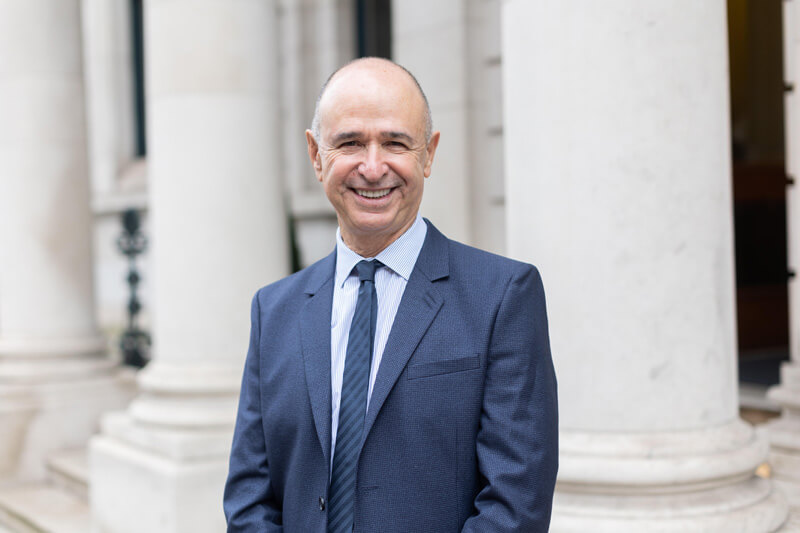
We have short memories. As we go about our daily business and enjoy our summer holidays here and abroad, we seem to have forgotten that the summers of 2020, 2021 and to some extent 2022 were very different because of the COVID pandemic, writes Dr. Peter Lachman.
It is important that in our new post COVID state we take stock of what happened and reflect on the many issues that arose during the ordeal we all went through. I want to focus on the conflict that arose between patient safety and person centred care.
On the HSE Quality Improvement Team Website it states that”
“Engaging and involving patients in the design, planning and delivery of all care demonstrates a commitment to person centred care. It ensures that care is appropriate to patients’ needs and is respectful of their preferences. Engagement builds a culture of listening to and learning from the care experiences of patients and their families. Focusing and delivering on the outcomes that matter to patients can only be achieved through meaningful engagement and partnership with patients, carers and their families.”
This is the core of a modern health service, moving from medico-centric care to a partnership where we take into account what matters to people. In addition, we need to consider the personal experience of care at every touchpoint on a person’s journey i.e. from the home to primary care and beyond. This is now termed as the Human Experience which “integrates the sum of all interactions, every encounter among patients, families and care partners and the healthcare workforce.”
COVID challenged this premise as safety became the core value and the positive human experience of both patients and healthcare workers was challenged. From a public health and safety perspective transmission of the virus had to be decreased. One of the consequences of placing this as a priority was that visitation rights to infected individuals in hospitals were curtailed. Many people died alone without their relatives and this had a major impact not only on the dying person and their families, but also on healthcare workers.
An opinion piece in the BMJ called this inhumane and unnecessary. A paper from Italy during the pandemic notes that although there was fear of cross infection, it could be managed with PPE and regulating visits, rather than banning them totally as was the case in many places. Overall, the visits to patients in the ICU by their loved ones led to positive responses and better appreciation of hospital staff. This reduced anxiety and maintained a better experience for all. Another paper during the pandemic called for better planning and consistency when considering restrictions.
Furthermore, two recent papers in BMJ Quality and Safety examine the ethical issues involved in deciding to limit visitation. In a research study in a New Zealand hospital, the balance between patient safety and preventing infection and person centred care and experience are examined. Hospitals restricted visiting on the premise that patient safety is achieved by protecting the healthcare system as a whole—patients, employees and visitors. This was also applied to care homes.
The casualty was person-centred care and the gains in person-centred care were lost. People were not consulted and this was imposed rather than coproduced and resulted in a negative effect on clinicians, patients and families. The study is fascinating to read, with a wealth of information on experience from those interviewed. The conclusion is that there was a lot of unintended harm as a result of the restrictions. The authors call for more transparency in policy development and coproduction of consistent and evidence based policy on visitation.
The ethics of the restriction of visitation is explored further in the accompanying editorial. There is a need to develop a framework that maximises benefit and decreases all harm, both physical and psychological. The framework needs to be proportional, fair and consistent, while respecting the autonomy of people to make decisions on risk and what really matters to them.
This is a very complex issue and I urge all to read the referenced papers. The challenge for us is to reflect and ask “what can we do differently” and how can we better manage this challenge in the future.
We certainly don’t want the same experience next time.
To read further
Bartoli D, Trotta F, Pucciarelli G, et al. The lived experiences of family members who visit their relatives in Covid-19 intensive care unit for the first time: A phenomenological study. Heart Lung. 2022;54:49-55. doi:10.1016/j.hrtlng.2022.03.012
Campbell L, Morley G. The Ethical Complexity of Restricting Visitors during the COVID-19 Pandemic [published online ahead of print, 2023 Jul 21]. BMJ Qual Saf. 2023;bmjqs-2023-016103. doi:10.1136/bmjqs-2023-016103
Collier A, Balmer D, Gilder E, Parke R. Patient safety and hospital visiting at the end of life during COVID-19 restrictions in Aotearoa New Zealand: a qualitative study [published online ahead of print, 2023 Feb 14]. BMJ Qual Saf. 2023;bmjqs-2022-015471. doi:10.1136/bmjqs-2022-015471
Jones-Bonofiglio K, Nortjé N, Webster L, Garros D. A Practical Approach to Hospital Visitation During a Pandemic: Responding With Compassion to Unjustified Restrictions. Am J Crit Care. 2021;30(4):302-311. doi:10.4037/ajcc2021611
Waraich A. Preventing family from visiting patients with covid-19 is unnecessary, cruel, and inhumane BMJ 22 February 2021.
Wolf JA, Niederhauser V, Marshburn D, LaVela SL. Re-examining “Defining Patient Experience”: The human experience in healthcare. Patient Experience Journal. 2021; 8(1):16-29. doi: 10.35680/2372-0247.1594.

